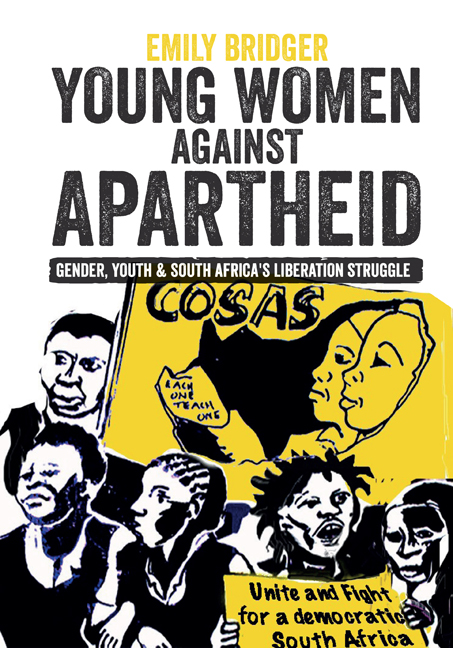Book contents
- Frontmatter
- Dedication
- Contents
- Acknowledgements
- List of Acronyms and Abbreviations
- Glossary
- Map of Soweto
- Introduction
- 1 African Girlhood under the Apartheid State
- 2 The School: Becoming a Female Comrade
- 3 The Home: Negotiating Family, Girlhood, and Politics
- 4 The Meeting: Contesting Gender and Creating a Movement
- 5 The Street: Gendering Collective Action and Political Violence
- 6 The Prison Cell: Gender, Trauma, and Resistance
- 7 The Interview: Reflecting on the Struggle
- Conclusion
- Bibliography
- Index
- Related James Currey titles on South & Southern Africa
2 - The School: Becoming a Female Comrade
Published online by Cambridge University Press: 09 February 2021
- Frontmatter
- Dedication
- Contents
- Acknowledgements
- List of Acronyms and Abbreviations
- Glossary
- Map of Soweto
- Introduction
- 1 African Girlhood under the Apartheid State
- 2 The School: Becoming a Female Comrade
- 3 The Home: Negotiating Family, Girlhood, and Politics
- 4 The Meeting: Contesting Gender and Creating a Movement
- 5 The Street: Gendering Collective Action and Political Violence
- 6 The Prison Cell: Gender, Trauma, and Resistance
- 7 The Interview: Reflecting on the Struggle
- Conclusion
- Bibliography
- Index
- Related James Currey titles on South & Southern Africa
Summary
‘Nobody taught me politics,’ Florence explained early on in our first meeting in 2014. At eight years old, Florence witnessed the chaos that engulfed Soweto in the wake of the 1976 student uprisings. Curious about what was happening, she constantly pestered her parents for answers and explanations, but they refused to give her any. ‘You mustn't ask such questions, because you’ll be arrested,’ her mother told her. A year later, Florence opened a newspaper to see a picture of Winnie Madikizela-Mandela standing in front of her Brandfort home. ‘She was so pretty,’ she described, ‘and I started reading because then, the only black pictures that we’d seen in the newspapers, they were adverts…and the prettiest ladies would be advertising Lux, the soaps, the creams.’ But Florence did not understand the context of the article, which presumably detailed Madikizela-Mandela's banishment to Brandfort in 1977. Florence asked her mother and grandmother about Winnie and what had happened to her, but ‘nobody could explain that because they were scared of explaining…And it started triggering something in my mind,’ she said, ‘why are these people not telling but I can see that there's something happening politically and people were dying?’ It would be another seven years before Florence finally found the answers she was looking for – not in her home or in Soweto's streets but in her secondary school, Bopasenatla, at the age of sixteen. There, she met male students already politicised and heavily involved in COSAS. Rather than shooing her away, the male comrades she met at school encouraged her curiosity, answered her questions, and helped to equip her with the understanding necessary to recruit other girls into the student struggle. ‘With COSAS,’ Florence exclaimed, ‘I felt I had a voice; as a human being, as a South African, and as a woman.’
These stories from Florence's childhood are illustrative of how and why girls growing up in Soweto made the unconventional decision to join the liberation struggle while still teenagers and school students. They resented being shielded from politics and moments of political disruption in the townships. They could see violence escalating around them, and yet were offered few answers at home as to why this was happening.
- Type
- Chapter
- Information
- Young Women against ApartheidGender, Youth and South Africa's Liberation Struggle, pp. 48 - 69Publisher: Boydell & BrewerPrint publication year: 2021



